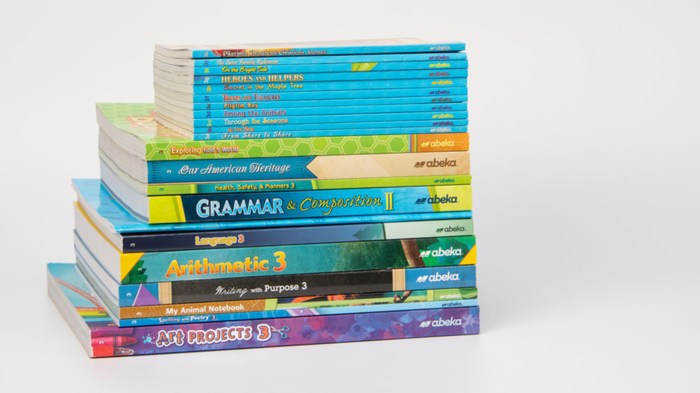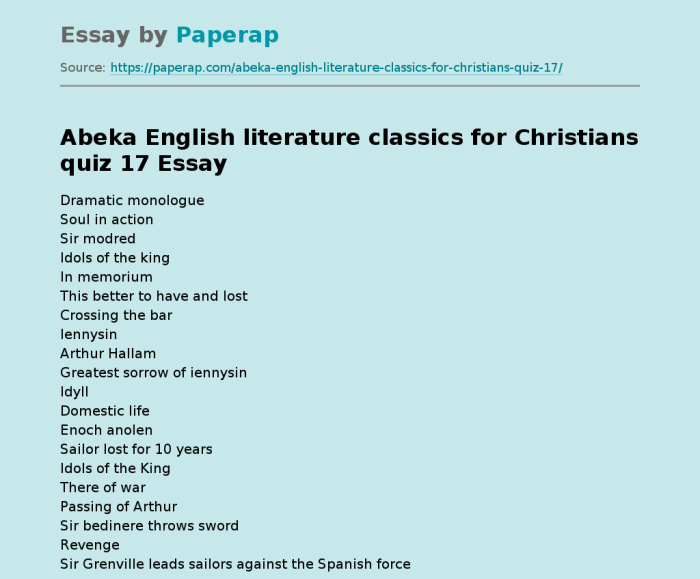The Abeka English Literature Test 1 is an essential assessment for students seeking to excel in their literary studies. Designed to evaluate students’ understanding of key literary works and their ability to analyze and interpret literature, this test serves as a valuable benchmark for academic progress.
This comprehensive guide will provide an overview of the test’s content and format, as well as effective preparation strategies and test-taking techniques. By delving into the intricacies of the Abeka English Literature Test 1, students can equip themselves with the knowledge and skills necessary to achieve their literary aspirations.
Introduction

The Abeka English Literature Test 1 is designed to assess students’ knowledge and comprehension of various aspects of English literature. It covers a range of topics, including literary analysis, vocabulary, and grammar.
The test is divided into multiple sections, each focusing on a specific area of English literature. These sections may include questions on literary terms, character analysis, plot development, and literary devices.
Content and Format, Abeka english literature test 1
The Abeka English Literature Test 1 typically consists of:
- Multiple-choice questions
- Short answer questions
- Essay questions
The multiple-choice questions test students’ knowledge of literary terms and concepts. The short answer questions require students to provide brief explanations or summaries of literary passages. The essay questions ask students to analyze and interpret literary works in depth.
Test Content: Abeka English Literature Test 1
The Abeka English Literature Test 1 covers a wide range of literary works, from classic novels to contemporary short stories. The test is designed to assess students’ understanding of these works, as well as their ability to analyze and interpret literary texts.
Key Literary Works Covered
- The Great Gatsby by F. Scott Fitzgerald
- The Catcher in the Rye by J.D. Salinger
- To Kill a Mockingbird by Harper Lee
- The Scarlet Letter by Nathaniel Hawthorne
- The Odyssey by Homer
Types of Questions Asked
The test includes a variety of question types, including:
- Multiple choice questions
- Short answer questions
- Essay questions
Multiple choice questions test students’ knowledge of specific facts and details from the literary works. Short answer questions require students to provide brief, concise answers to questions about the works. Essay questions ask students to analyze and interpret the works in more depth.
Assessment Criteria
Student responses are evaluated based on the following criteria:
- Accuracy
- Comprehension
- Analysis
- Interpretation
- Writing skills
Accuracy refers to the correctness of students’ answers. Comprehension refers to their understanding of the literary works. Analysis refers to their ability to break down the works into their component parts and examine how they work together. Interpretation refers to their ability to make inferences and draw conclusions about the works.
Writing skills refer to their ability to communicate their ideas clearly and effectively.
Test Format
The Abeka English Literature Test 1 is divided into three sections, with a total of 40 questions.
If you’re getting ready for Abeka English Literature Test 1, don’t forget to check out a thousand splendid suns poem for some extra inspiration. This powerful poem captures the resilience of women in the face of adversity, a theme that’s sure to be explored in the test.
So make sure you give it a read before you sit down to take the exam.
The test is timed, with a total of 60 minutes allotted for completion. Students with disabilities may be eligible for accommodations or modifications, such as extended time or a separate testing environment.
Number of Sections
- Section 1: Multiple Choice (20 questions)
- Section 2: Short Answer (10 questions)
- Section 3: Essay (10 questions)
Time Allotted
The time allotted for each section is as follows:
- Section 1: 25 minutes
- Section 2: 20 minutes
- Section 3: 15 minutes
Accommodations and Modifications
Students with disabilities may be eligible for accommodations or modifications to ensure equal access to the test. These accommodations may include:
- Extended time
- Separate testing environment
- Assistive technology
Preparation Strategies
To effectively prepare for the Abeka English Literature Test 1, consider these strategies.
Begin by reviewing the course materials and assignments. Focus on understanding the concepts and ideas presented in the texts and lectures.
Study Resources and Materials
- Utilize the Abeka English Literature textbook and online resources.
- Consult additional literary analysis books or websites for further insights.
- Seek assistance from your teacher or a tutor if needed.
Improving Reading Comprehension and Literary Analysis Skills
Enhance your reading comprehension by practicing active reading techniques.
- Annotate the texts while reading, highlighting key points and making notes.
- Summarize each chapter or section to reinforce understanding.
- Engage in discussions or write short essays to articulate your interpretations.
Develop your literary analysis skills by:
- Identifying literary devices and their effects on the text.
- Analyzing character development, themes, and symbolism.
- Practicing writing literary essays that support your interpretations with evidence from the text.
Test-Taking Strategies

Time management and effective question-answering techniques are crucial for success in any exam. Here are some strategies to optimize your performance:
Time Management
- Prioritize Questions:Start with questions you are confident in to build momentum and manage time effectively.
- Time Allocation:Divide the total test time among different sections or question types, ensuring you allocate more time to challenging questions.
- Estimate Time:Quickly scan the test and estimate the time you will spend on each question based on its complexity.
- Avoid Spending Too Much Time:If you get stuck on a question, move on and return to it later if time permits.
Answering Different Types of Questions
Different question types require specific strategies:
- Multiple Choice:Eliminate incorrect options first and choose the best answer from the remaining options.
- True/False:Determine the validity of the statement and provide supporting evidence or a brief explanation.
- Short Answer:Provide concise, specific answers that directly address the question.
- Essay:Organize your thoughts, provide evidence from the text, and develop a coherent argument.
Handling Challenging Questions
Unfamiliar or challenging questions can be handled by:
- Break Down the Question:Identify the key components of the question and break it down into smaller, more manageable parts.
- Use Context Clues:Look for clues in the surrounding text or questions to understand the meaning and context of the question.
- Guess and Check:If all else fails, make an educated guess and check your answer against the available options.
Questions Often Asked
What is the purpose of the Abeka English Literature Test 1?
The Abeka English Literature Test 1 is designed to assess students’ understanding of key literary works, their ability to analyze and interpret literature, and their reading comprehension skills.
What are the key literary works covered in the test?
The test covers a range of literary works, including novels, short stories, poems, and plays. The specific works included in the test vary depending on the grade level and curriculum.
What types of questions are asked on the test?
The test includes a variety of question types, such as multiple choice, short answer, and essay questions. These questions assess students’ understanding of the literary works, their ability to analyze and interpret literature, and their writing skills.